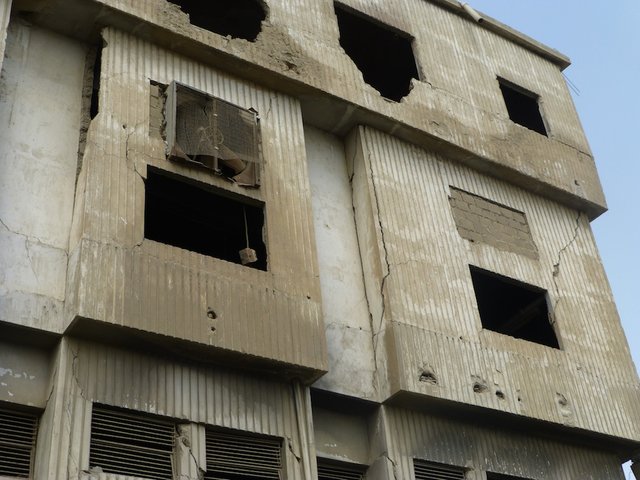Is fashion worth dying for?
I've been talking a lot about abundance recently, and the fact that – in the wealthier countries at least – most of us have so much stuff that we don't even know what to do with it all. Sometimes I feel this is actually stopping people from buying new things! We've already got enough (in my case anyway!).
I was made redundant nine years ago, and then I started running my own business, a café. My work uniform was an apron, so I just needed to wear comfortable clothes that I could move around in easily. That's when I realised just how many clothes I had! I really didn't need to buy new ones, and I just got out of the habit of buying.
But there was another aspect to this, because in 2012, there was a horrific tragedy in Pakistan, when 250 people were killed in a factory fire at Ali Enterprises. I remember hearing about this, and I was horrified that there were bars at the window, which prevented people from escaping.
Apparently there was only one company that even admitted links to this factory. It was a German company, and its branding was found in the ashes. That company paid compensation to the victims families, but I think it was the only company to do this.
That tragedy was eclipsed by a bigger tragedy in terms of numbers in 2013, when 1,134 people were killed in the terrible Rana Plaza factory collapse in Bangladesh.
I remember at the time the companies that had clothes being made in that factory just seemed to distance themselves from it. They didn't want to admit any links, and it took a lot of time and pressure before they did admit that their clothes were being made there. I don't know whether any compensation was paid to the relatives.
A watershed
The actual brand names didn't really matter. The whole thing just put me off that kind of fashion shopping. I remember watching the BBC News shortly after the tragedy, and they were doing a vox pop, asking people how they felt about the tragedy, and about buying clothes from those shops again. Everyone interviewed seemed to just accept it, glibly expressing concern, but saying that they had no choice but to continue shopping in the shops.
That kind of sickened me a bit. I didn't want to point the finger at anyone – it's true, we all have to buy clothes if we're working, and we don't all have enough money to be able to pick and choose where we buy our clothes from. But I did wonder if that particular vox pop might have been edited, because if they'd interviewed me, I wouldn't have said that. It left me with a bad feeling.
I've hardly gone anywhere near the High Street since then – partly because of the situation I was in. I didn't have as much money as I used to, and I wasn't going into town as much anyway. But the tragedy did stick in my mind.
At the time, I did make an attempt to find alternative companies that monitored the conditions in which their garments were made. I only found two. One was www.komodo.co.uk, and the other one was an Australian company – I forget the name. I bought clothes from both of those companies. However I found the Australian company's fashions a little bit dull. They seemed to be aimed at a certain demographic that I just didn't see myself as part of. I think I bought some socks and maybe some underwear from them. I like Komodo's fashions though, and I did buy some things from them. They're still going strong.
But those were the only two companies I could find. When I did looked up "ethical fashion", it all seemed to be either vegan fashion and organic cotton.
I remember looking at the American Fair Work Society (apologies – I meant the Fair Labor Association) and thinking, "this might be a good thing" – however all the big multinational companies had signed up to it, including some companies that have very dodgy records where labour standards are concerned, so it just seemed to me like a big PR stunt.
Young designers setting new standards
Recently I went to an event about waste at a local independent store, and there was a young woman speaker called Kat Garbutt. She is a textile designer, a graduate of Tama University in Japan, and she's very interested in ethical clothing and ethical fashion. Her presentation opened my eyes to the fact that there are some fashion companies now coming up – many of them very small companies, which directly look back to the Rana Plaza disaster and set strong labour standards for the production of their clothes.
Some of those companies are quite difficult to find, because they're so small, but there are websites like the fair shop and fashion-conscience.com that are sourcing their clothes ethically, or are providing a showcase for companies that produce clothes in ethical conditions.
There's a new movement known as the Slow Fashion movement. It's all about thinking about where the clothes are made, and making clothes with love and care, made to last, compared to the fast-fashion syndrome of wasteful fashion and cheaply-made, throwaway clothes.

Cioch is still in business. I've heard that they also make clothes for Paramo. I might be wrong there, but I think that's the case. And I still wear that jacket today, almost 25 years later!
Ethically-made outdoor gear
I buy a lot of outdoor clothing, because I'm always doing hillwalking and mountaineering. And by the way, this isn't about me, or about being oneupmanship! I'm not trying to say, "I'm a very ethical, pure person." Sometimes I do buy cheap gear, especially over the last few years, because I haven't really had the money to buy expensive clothes. And I quite often buy second hand things – I bought second-hand winter boots last year.
But there are companies that make really good quality, ethically-made outdoor gear. One of them is Paramo. I think most of their clothing is made in Chile, and in other countries too – but in ethically monitored conditions.
In 1995 I travelled round the world, including a trip to the Himalayas. Before I left home, I had a jacket made for me in the Isle of Skye, by a then tiny company called Cioch Direct. I visited their headquarters, which was the attic of the owners' home, and the company director was sitting at the sewing machine making clothes.

Cioch is still in business. I've heard that they also make clothes for Paramo. I might be wrong there, but I think that's the case. And I still wear that jacket today, almost 25 years later!
If you buy clothes that are well made and made with love and care, they will last. That's the attitude that I would like to have going forward. It doesn't mean I won't buy cheap clothes again. It's just about putting more thought into fashion and clothing choices.
I do love nice clothes, and it's nice every now and then to buy a really special outfit that you know is going to last, that you love. And if you're the kind of person that loves to change your outfits regularly, that shouldn't stop you buying well-made clothes. I've got a friend who is quite wealthy, and she often buys designer clothes on eBay. She'll wear them once or twice, and then she sells them on eBay. So she always has these incredible outfits, but she doesn't have massive wardrobes full of clothes – she just changes them every now and again.
To wear something that feels good and is made with love and care – I think that's really important!
Other links
Posted from my blog with SteemPress : http://ramblingandscrambling.co.uk/videos/is-fashion-worth-dying-for/
 )
).gif)




Congratulations! This post has been chosen as one of the daily Whistle Stops for The STEEM Engine!
You can see your post's place along the track here: The Daily Whistle Stops, Issue 276 (10/09/18)
All I will say to this is "Amen sister." Amen.
We just need a functional and comfortable clothes and buying clothes when you already have lots of it is just a waste.
We just live in a time that we get influenced a lot now by marketing schemes by businesses that tells us that we have to want something that we do not actually needed.
True, and the marketing is often designed to make us feel insecure, so we buy the product to make ourselves feel better.